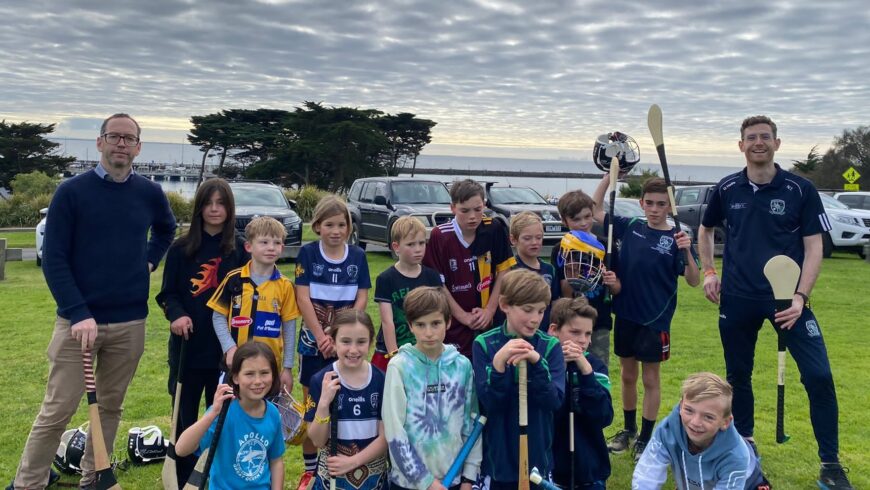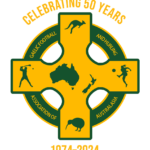On Sunday 4 June, Geelong Gaels was excited to celebrate the 160th anniversary of the ‘Geelong Rules’ (read below) as part of the National Celtic Folk Festival in Portarlington.
The Gaels’ youth section, the Grasshoppers, were led to an exhibition hurling match by a pipe band before putting their hurling skills on display for the large crowd that had followed them to the pitch. Afterwards, members of the public donned helmets and grabbed hurleys to have a go at some of the skills of hurling under the guidance of our coaches.
The day concluded with a poc fada for both juniors and adults. The sound of sliotar on hurley rang across the Portarlington foreshore as participant after participant tried their hand at the long poc in the hope of being crowned our 2023 champion. After some intense competition and quality striking the poc fada champions where Clare Mullen and Alan Corcoran.
Many thanks go to the organisers of the National Celtic Festival, especially Una McAlinden and Shauna McConnell, for welcoming us into the festival, as well as the coaches and families of the Geelong Gaels who attended the event. We look forward to continuing our involvement in coming years.
‘Geelong Rules’ – a celebration of 160 years of hurling rules in Geelong
Many believe that the establishment of the Gaelic Athletic Association in 1884 (and hurling rules adopted in 1885) was the first time a set of hurling rules were published, however a group of hurlers in Geelong Australia agreed on a set of rules for a St. Patrick’s Day game over years earlier.
The 1801 Act of Union and later the Great Famine caused vast numbers of Irish people to emigrate to America and Australia bringing with them their native culture and traditions. It was less 15 years after the height of the famine that a group of Irish emigrants decided to play a hurling match in Germantown (now Grovedale outside Geelong, Australia).
The game involved 25 players from Geelong competing against a country team for St. Patricks Day in 1863. Before the game went ahead, due to the fact that those involved had come from all parts of Ireland, an agreed set of rules was required.
On the 12th of March, the organisers held a meeting at Mr. Loughnan’s Royal Charter Hotel. At this meeting the group of hurlers proposed and seconded the 6 following rules:
Rule 1: That no tripping be allowed
Rule 2: That fair jostling, shoulder to shoulder, be allowed
Rule 3: That the ball shall not when in play be lifted from the ground by the hand except it alight in water or in a ditch, or meet with some other obstruction, when it may be so lifted, but shall then be thrown fair, and in the course it would have gone had it have not met with any impediment to its progress
Rule 4: That any player making a stroke with his hurley with the intention of doing any bodily harm to an opponent, be given up at once to the authorities by the stewards.
Rule 5: That any player inadvertently transgressing the foregoing rules, shall justify the stewards’ interference, who shall caution the player, and if the ball shall have been played foully it shall be brought back to the place whence it may have been wrongly played.
Rule 6: That any member appearing on the ground during the progress of the game the worse of drink, he shall be expelled from the game At the end of the meeting “it was unanimously resolved that the following rules and regulations be adopted.”
Two days later a written record of the meeting and rules was published in the Geelong Advertiser on 14 March 1863. Unbeknownst to those involved at the time they inadvertently had agreed on the oldest published set of rules for the game of hurling in the world (including Ireland).






